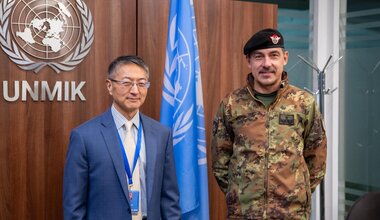A story of expectations, resilience, and hope: UNMIK film “Romni” raises awareness about child marriage
In theatres and community centres throughout Kosovo, UNMIK brought a global campaign against Gender-based violence to a local level, sparking discussion and raising awareness about early marriage. As part of the 16 Days of Activism Against Gender-based Violence Campaign in Kosovo, UNMIK screened two films that brought the topic to light through the inspiring story of a young woman named Shpresa.
In the UNMIK-produced film “Romni” and accompanying documentary “Like a Real Woman,” viewers follow Shpresa, a high school student from a Roma community in Kosovo who takes a stand against expectations that she will marry before finishing school.
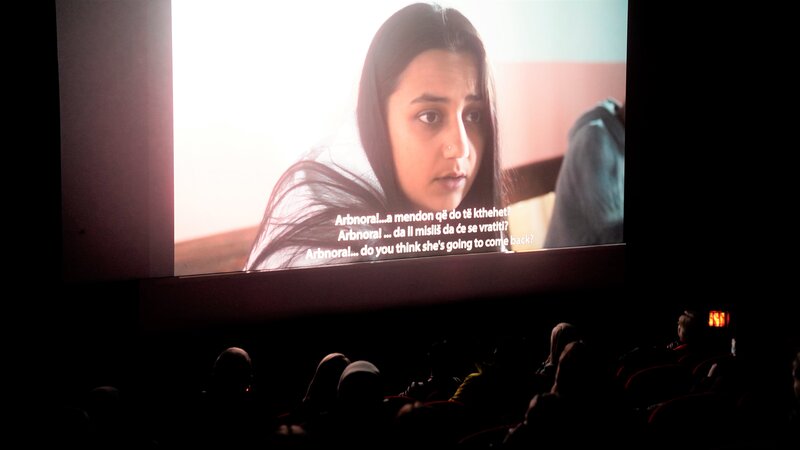
Screenings took place during the 16 Days Campaign in Lipjan/Lipljan, North Mitrovica, South Mitrovica, Graçanicë/Gračanica, Prizren and Pristina. Each screening was accompanied by panel discussions with local activists, civil society leaders, and the youth, discussing the importance of taking action against gender-based violence.
At the final screening at Kino Armata in Pristina on International Human Rights Day, Deputy Special Representative of the Secretary-General Barrie Freeman noted that - while set in Kosovo and featuring representatives from the Roma community, the themes explored in the films were universal. She further highlighted how the topics of the film played out in the details, saying, “Shpresa isn’t just the name of the character in this film, it also means ‘hope’ in English.”
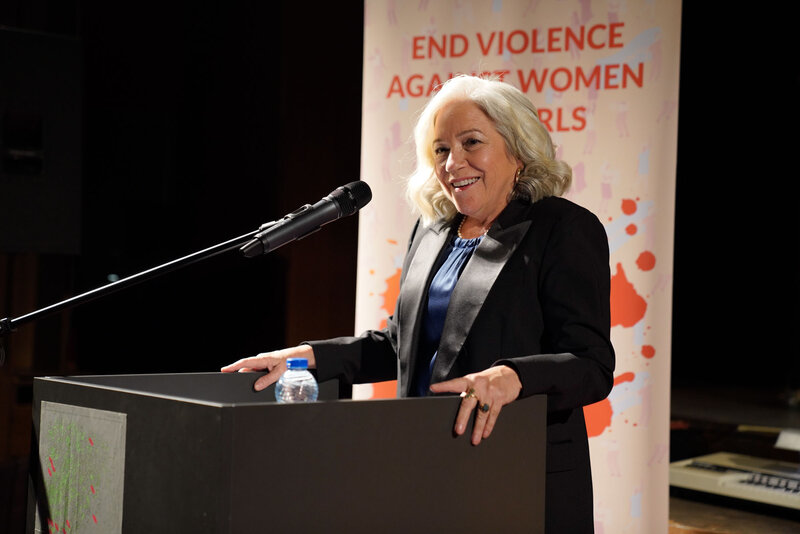
DSRSG Freeman highlighted that girls who marry before the age of 18 are more likely to experience domestic violence and less likely to remain in school. According to the 2021 Sustainable Development Goals report, the COVID-19 pandemic may increase child marriage around the world by 10 percent.
The theme of hope played a recurring role in the post-screening discussions, with many panellists citing the progress communities in Kosovo have made in reducing early marriage as a sign that the phenomenon is in decline.
There is still much work to be done though, and all members of society have a responsibility to fight early marriage, as Graçanicë/Gračanica panelist Ms. Aziza Ramić of the NGO Roma Women in New Century emphasized: ‘’Talk with girls more. Support them, or find someone they trust, but talk to them. There is a discrimination issue as well. This is on us. You need to try. I did. It is not easy. It takes step by step.’’
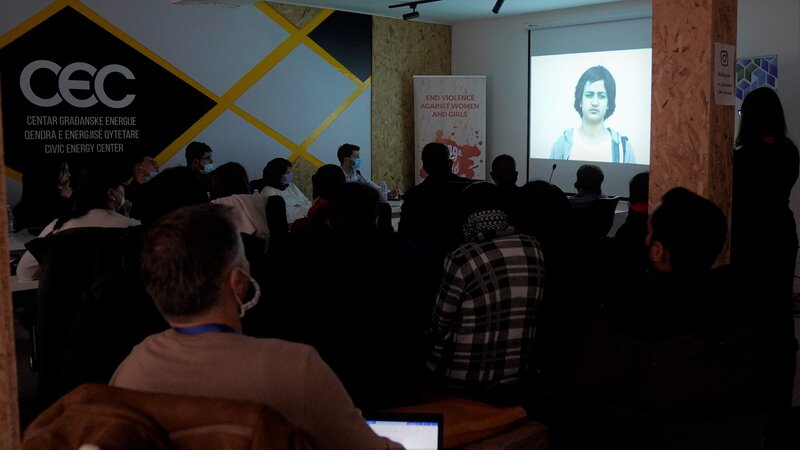
The Graçanicë/Gračanica screening attracted a young, energetic audience.
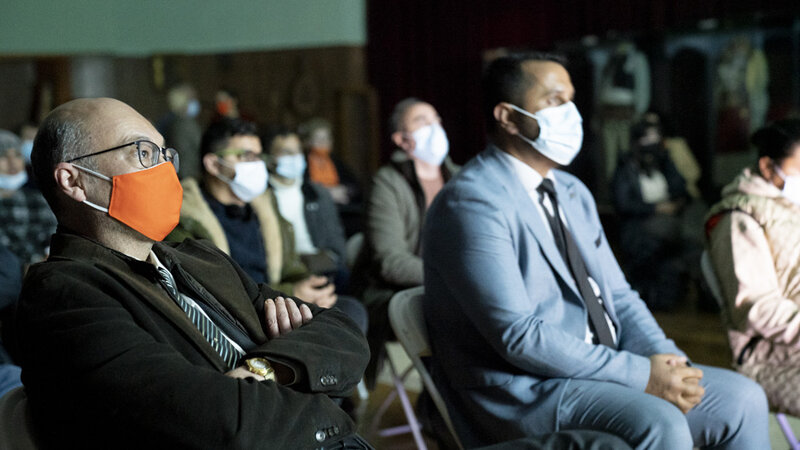
At the Lipjan/Lipljan screening, Mrs. Makfirete Shamolli, Director of the Center for Social Work, echoed this sentiment, stressing: “We need to first change ourselves and how we think, which mostly is not in line with the contemporary societal development and all the human rights conventions. Only then we will manage to eradicate all forms of violence and discrimination.
Prejudice and Poverty at the Core of the Issue
Much of the discussions also centred on the root causes of early and forced marriage. At the heart of the issue, Pristina panellist Mr. Driton Berisha of the Roma Education Fund noted, is poverty – an underlying, often overlooked factor in early marriages.
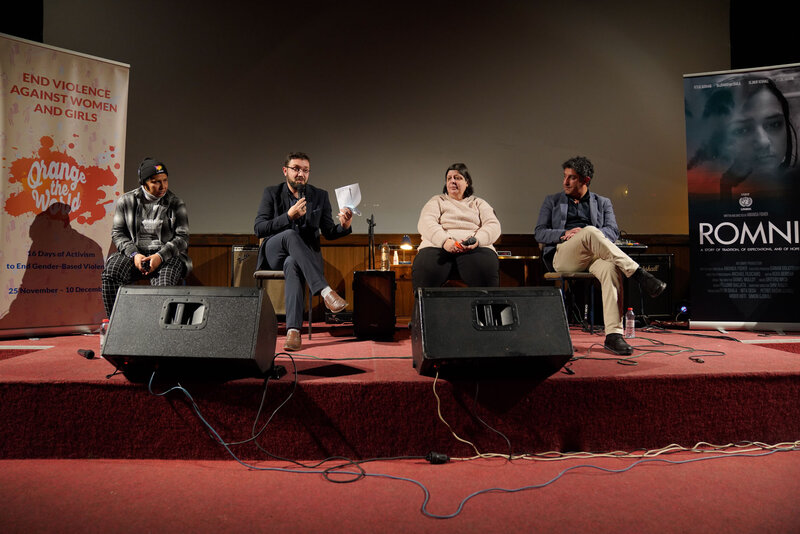
At the Pristina screening, Human Rights Activist Edis Galushi moderated a discussion on how to combat early marriage.
Noting prejudice and discrimination towards Roma, Ashkali and Egyptian community members, Mr. Berisha told the audience: “This is not tradition – this is not something parents want, for their daughter to get married early. If you ask a Roma, Ashkali, or Egyptian parent what they want for their son or daughter, they will tell you they want their son to have a good job and good family after they obtain that. Same for their daughter.”
Sadete ‘Nana’ Gashijan, a panellist at the Pristina screening and a community leader whose personal story inspired the film agreed, adding, “In Kosovo, because of poverty, parents propose to marry and send their daughters to other countries, thinking this will give them a better life, but the opposite happens.”
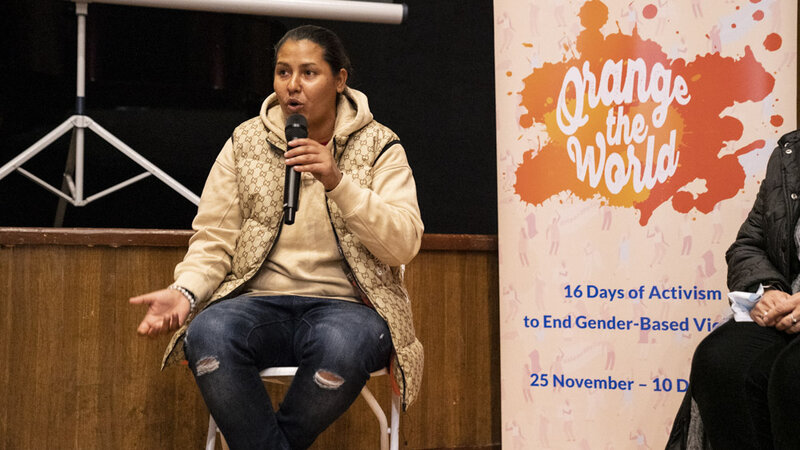
Sadete ‘Nana’ Gashijan, whose personal story inspired “Romni”, speaks to the audience in South Mitrovica.
Nevertheless, Ms. Gashijan said, hope is on the horizon. In Mitrovica, where she works as a community leader, she says more girls are staying in school and therefore delaying marriage; “Five years ago, it was forbidden for some children to attend school past a certain grade, now I see many more girls staying in school.”
Knowledge is Power: UNMIK aims to raise awareness
Another panellist in Pristina, Ms. Shpresa Agushi, Director of the Network of Roma, Ashkali and Egyptian Women's Organizations of Kosovo, agreed, noting that even in the seemingly simple task of raising awareness, much more progress has been made, “Even as recent as 2010 people were aware of early marriage, but they didn’t feel it was worth discussing yet.”
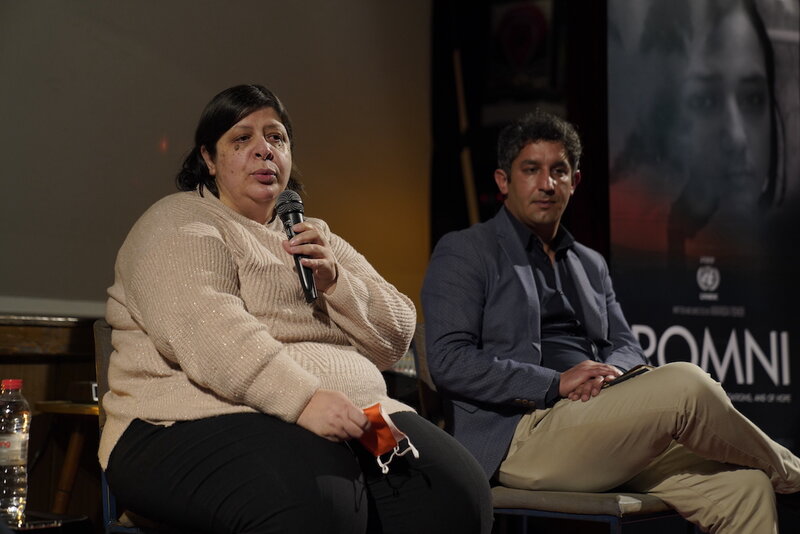
Ms. Shpresa Agushi at the Pristina discussion.
Indeed, raising awareness is a key goal for UNMIK and partners. The films were produced to accelerate change in perceptions around the topic of early marriage to fight prejudice against Roma, Ashkali, and Egyptian communities and recognize the efforts of those working tirelessly to eliminate this harmful practice.

At the South Mitrovica screening, the audience participated in a lively question and answer period.
At the South Mitrovica screening, Deputy Minister for Communities and Returns, Mr. Gazmen Salijević noted that prejudice continues to compound the economic conditions that drive early marriage in non-majority communities, but said he is hopeful that empathetic, human-centred films like Romni would raise awareness and battle stereotypes in Kosovo, especially for the younger generations.
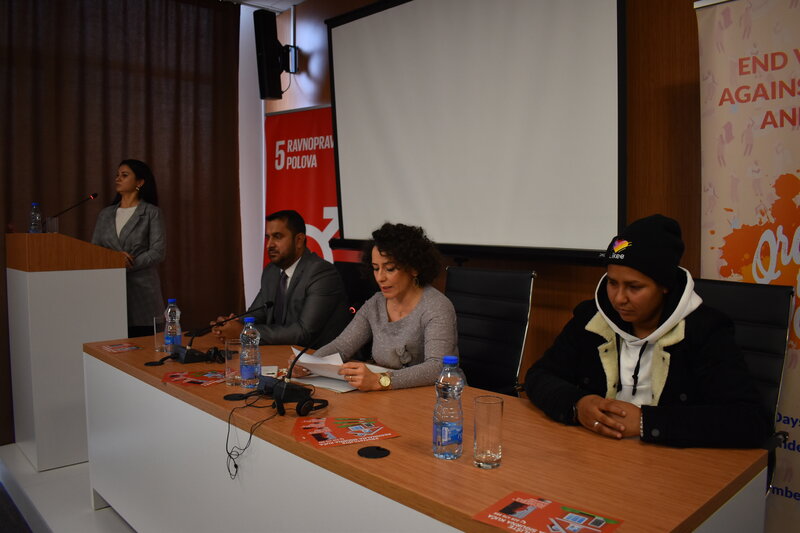
Ms. Gashijan, Deputy Mayor Adrijana Hodžić and Deputy Minister for Communities and Returns, Gazmen Salijević.
Prior to the screening in North Mitrovica Mayor Milan Radojević expressed hope that results of the fight to end gender-based violence will be even better in the times to come, while Deputy Mayor Adrijana Hodžić stressed that early and forced marriages represent a gross violation of human rights and rights of children, including both girls and boys: “Empowerment of women and education are the key. It also represents a challenge and responsibility of an entire society in Kosovo, and everybody should do their part in eliminating this phenomenon.”
UNMIK Gender Advisor Javiera Thais Santa Cruz told an audience of young people at a screening in Prizren, “Ultimately, the film is yours – for you to view and share. You are the best ambassadors of the film and the topic.”
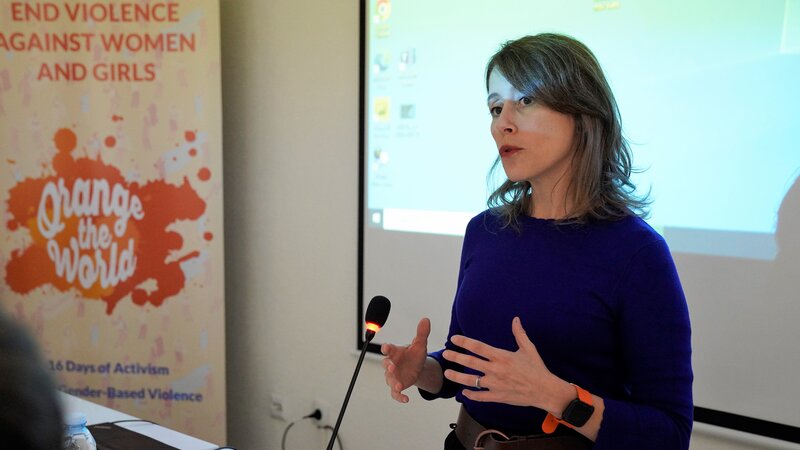
UNMIK’s Gender Advisor Javiera Thais Santa Cruz at the Graçanicë/Gračanica screening.
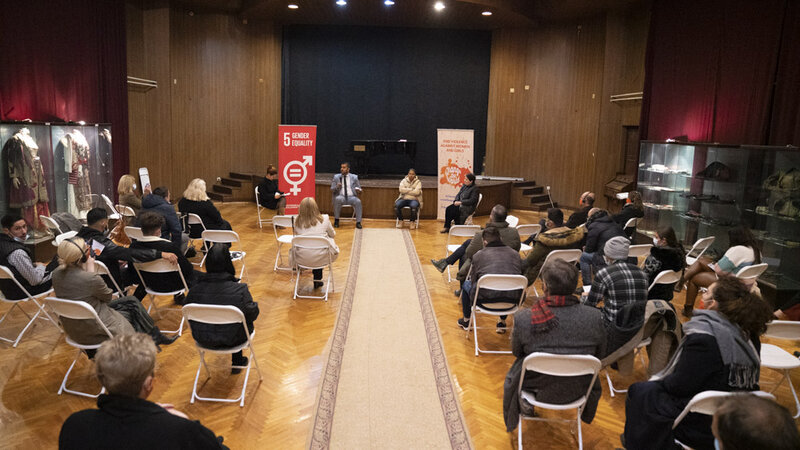
Screening and discussion in South Mitrovica.
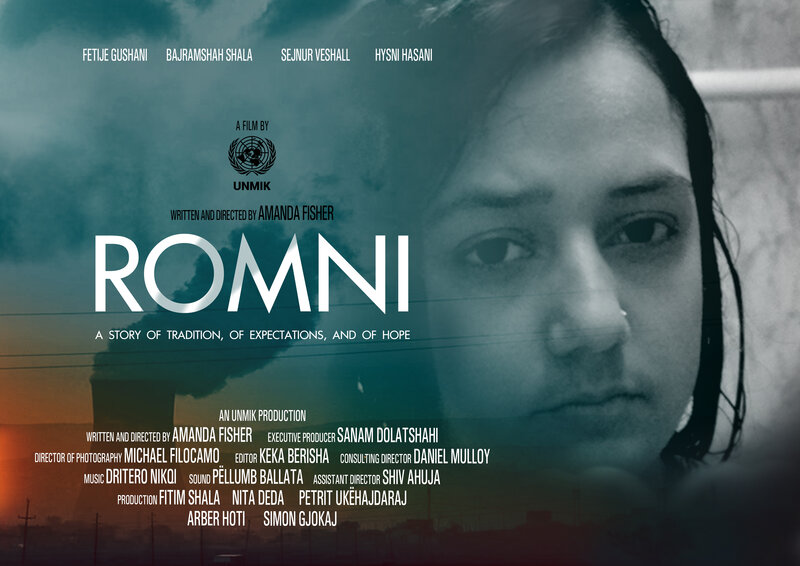
 UN
UN United Nations Peacekeeping
United Nations Peacekeeping





